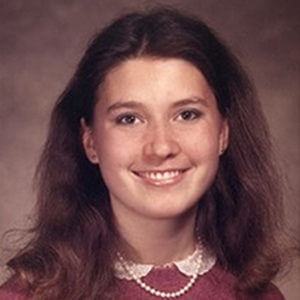About MCVRC
On April 3, 1982, Stephanie Roper became an innocent victim of crime in Maryland.

“One person can make a difference and every person should try“
She was a college senior about to graduate from Frostburg State University, home for a weekend visit with with her family in Prince George’s County. After leaving her friend’s home, her car became disabled. Two men, Jack Ronald Jones and Jerry Beatty, came upon and kidnapped her, and over a five-hour period, brutally raped, tortured, and murdered Stephanie.
Friends and neighbors who had known and loved Stephanie found it impossible to do nothing. Frustration and anger were diverted into acts of love toward Stephanie’s family. A small group was formed to help them through the funeral and subsequent criminal trials, by the Stephanie Roper Family Assistance Committee. In October 1982, the group incorporated as the Stephanie Roper Committee and Foundation, Inc. Guided by the cause, Stephanie’s memory, and the leadership of Stephanie’s parents, Vince and Roberta Roper, volunteers came forward to form the staff. Goals and priorities were set, chapters were formed, space was donated, and the first office opened.
Twenty years later, in the Fall of 2002, the sister organizations bearing Stephanie’s name merged to become the Maryland Crime Victims’ Resource Center, Inc., a statewide non-profit organization dedicated to serving the interests of crime victims in Maryland, while maintaining a nationwide reputation for dedicated advocacy and services.
Today, MCVRC’s victim advocates and attorneys serve victims of crime in every jurisdiction in the State of Maryland by providing a diversity of services including: information, referral and assistance; direct legal representation; court accompaniment; support groups; community education; criminal justice education; policy advocacy; technical assistance for allied professionals and criminal justice agencies; and faith-based referrals.
From The Founder – Roberta Roper

Over the years, many people have asked me how I could do the work of an advocate, that it must be so challenging and depressing. My reply has been how could I not do this work if I hoped to survive? Yes, it has been the most challenging work of my life, but it is far from depressing. It has been the most rewarding work of my life because it has empowered victims to not only find hope and healing, but to become thriving survivors. It is work inspired by individuals who despite the suffering and injustice they have endured, Have courageously mustered the strength to survive with dignity and live happy and productive lives.
I have kept and treasured a description written years ago by an unknown advocate who simply and eloquently defined that role:
Advocacy means that I have to be willing to work on a problem that society would rather not admit to having. It means that I must have the strength to face the worst that society has to offer and not despair. It means that I must be able to care enough about total strangers to help them put their lives back together after it has been torn apart, and sometimes they have been rejected by their family and friends. Being an advocate means that I am willing to work to make this world a better place, even though the work goes unnoticed by the public.
